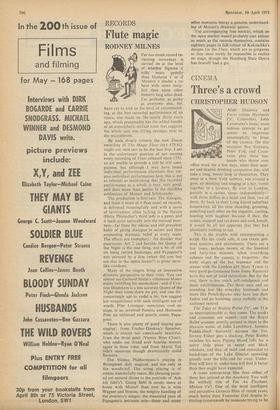Flute magic
RODNEY MILNES
Far too much record re- viewing nowadays is carried on at the level of whether Signora x trills more prettily
than Madame Y or if Maestro z shades a ru, bato with more innig-
keit than some other maestro long since dead. I'm probably as guilty as everyone else, but have yet to sink to the level of recommend- ing, as the best recorded performance of an opera, one made on 78s nearly thirty years ago, which presumably has the added benefit of an atmospheric surface noise that suggests the whole cast was frying sausages next to the microphone.
By such dreary criteria the new Decca recording of The Magic Flute (SET 479-81) might not turn out to be the best buy. I am in the unfortunate position of not owning every recording of Flute released since 1791, so am unable to provide a trill by trill com- parison, but although I may have heard individual performances elsewhere that sur- pass individual performances here, this is not so relevant as maintaining that this recorded performance as a whole is very, very good, and does more than justice to the childlike sublimities of Mozart and Schikaneder.
The production is first-rate. The dialogue, and there is more of it than usual on records, is delivered meaningfully and with a sense of involvement often lacking in the theatre (Hetty Pltimacher's third lady is a gem), and it leads quite naturally into the musical num- bers—far from the odious and still prevalent habit of giving dialogue to, actors and thus suspending dramatic belief at every seam. The effects are exemplary: the thunder that punctuates Act 2 and heralds the Queen of the Night is the real thing, not a bit of old tin being rattled backstage, and Papageno's exit pursued by a lion (when did you last see that in the opera house?) is given MGM- like vividness.
Many of the singers bring an impressive dramatic perspective to their roles. You can almost see Gerhard Stolze's villainous•Mono- states twiddling his mustachios , and if Cris- tina Deutekem is a less accurate Queen of the Night than some (here we go), and one dis- concertingly apt to yodel a bit, few suggest her vengefulness with such intelligent use of words. Pilar Lorengar, sometimes cool on stage, is an involved Pamina and Hermann Prey an unforced and quietly comic Papa- geno.
There is also plenty of good singing qua singing: from Fischer-Dieskau's Sprecher, which is almost too consciously beautiful, from the three genii (Vienna Boys Choir), who make me dread ever hearing women again in these roles, and from Martti Tal- vela's sonorous though dramatically stolid Sarastro.
The Vienna Philharmonic's playing is throughout duly magical, and not only in the woodwind. The string playing is of course wonderfully suave, the phrasing point- ed yet natural (listen to the postlude of `Ach ich files). Georg Solti is surely more at home with Mozart than ever he is with Wagner and Strauss; the weighty handling of the overture's adagio, the measured pace of Papageno's entrance aria—these and many
other moments betray a genuine understand- ing of Mozart's dramatic genius.
The accompanying free booklet, which on the open market would probably cost almost as much as the records themselves, contains eighteen pages in full colour of Kokoschka's designs for the Flute, which are as gorgeous as they must surely be impossible to realise on stage, though the Hamburg State Opera has bravely had a go.










































 Previous page
Previous page